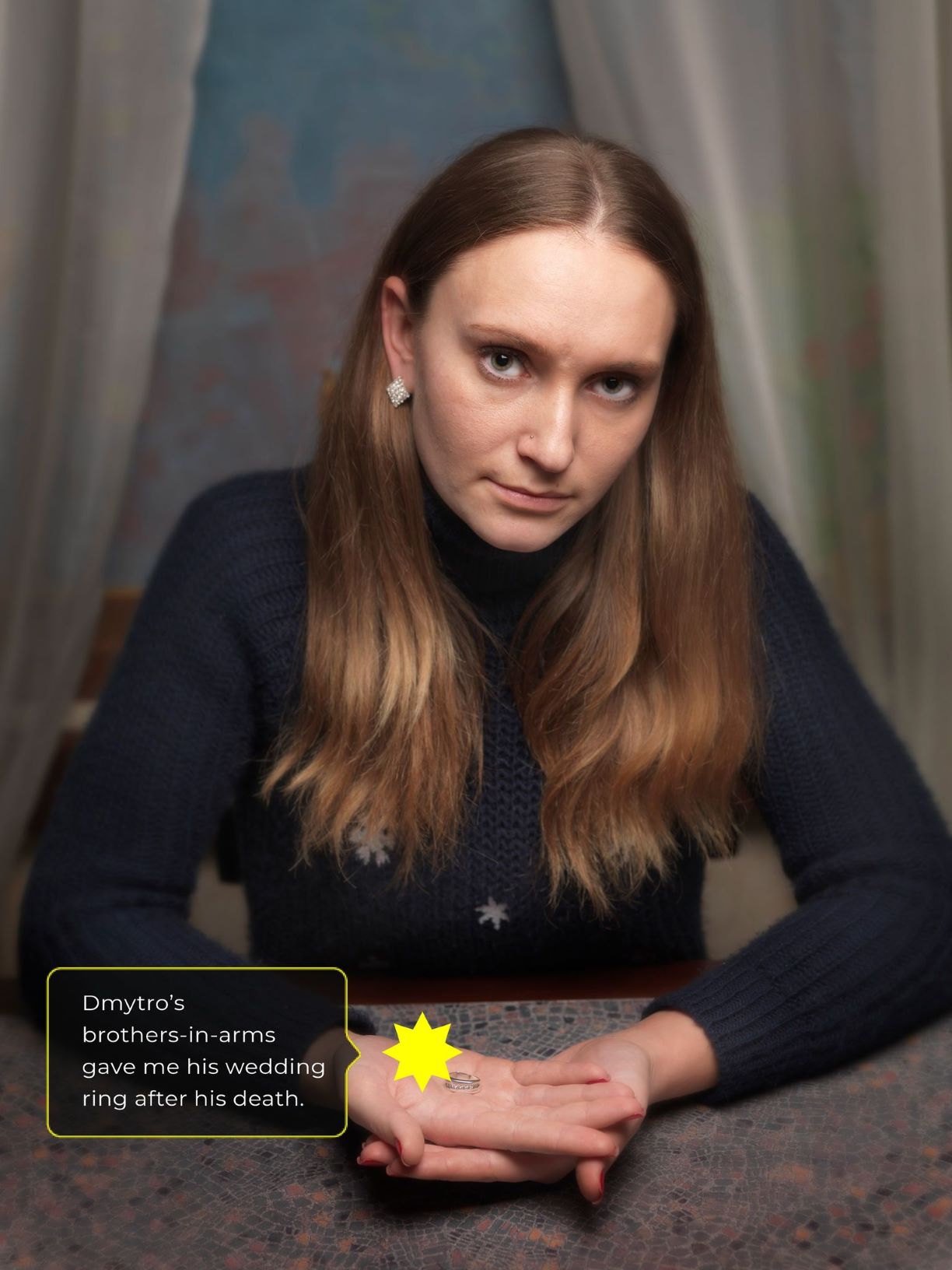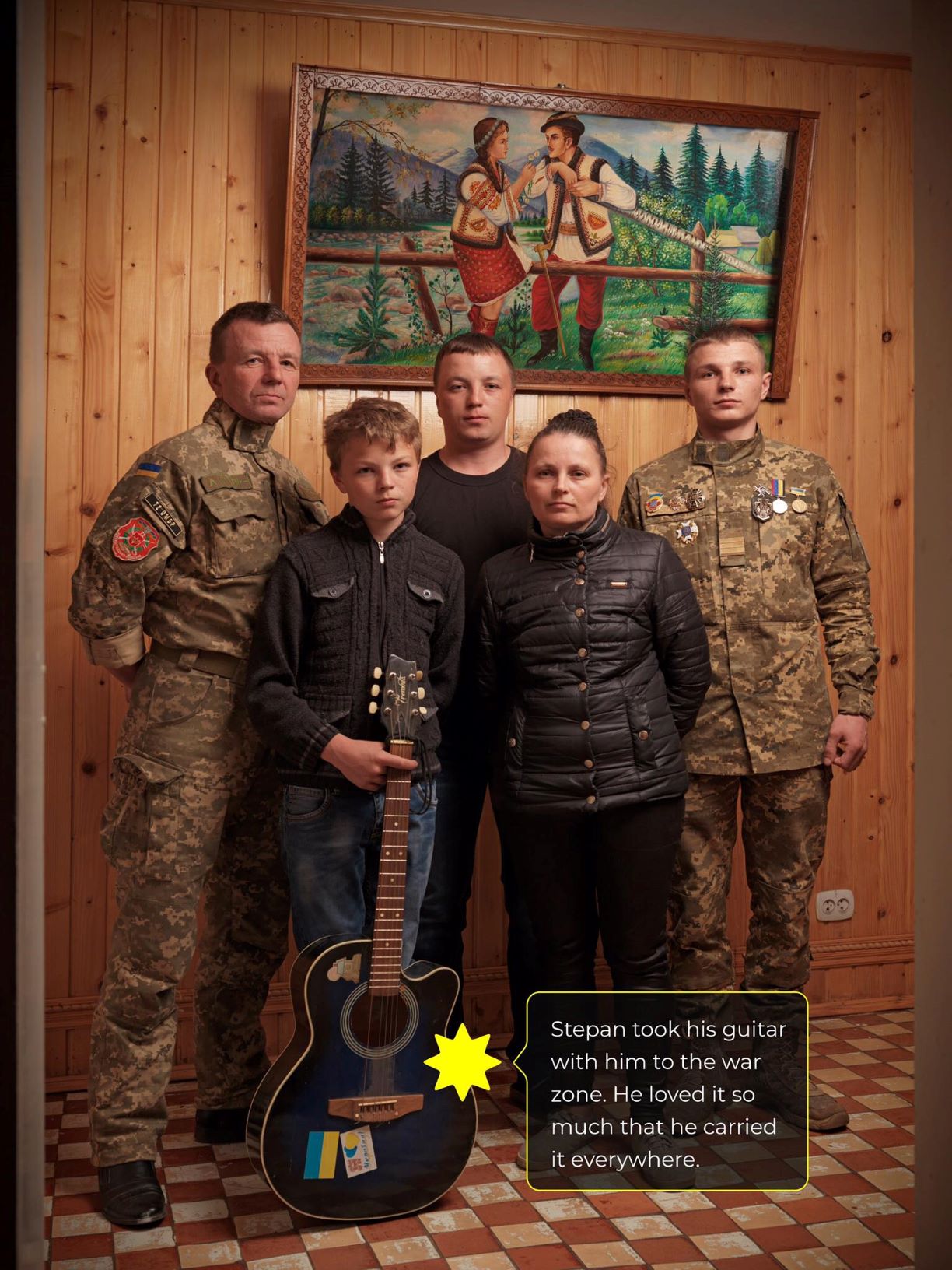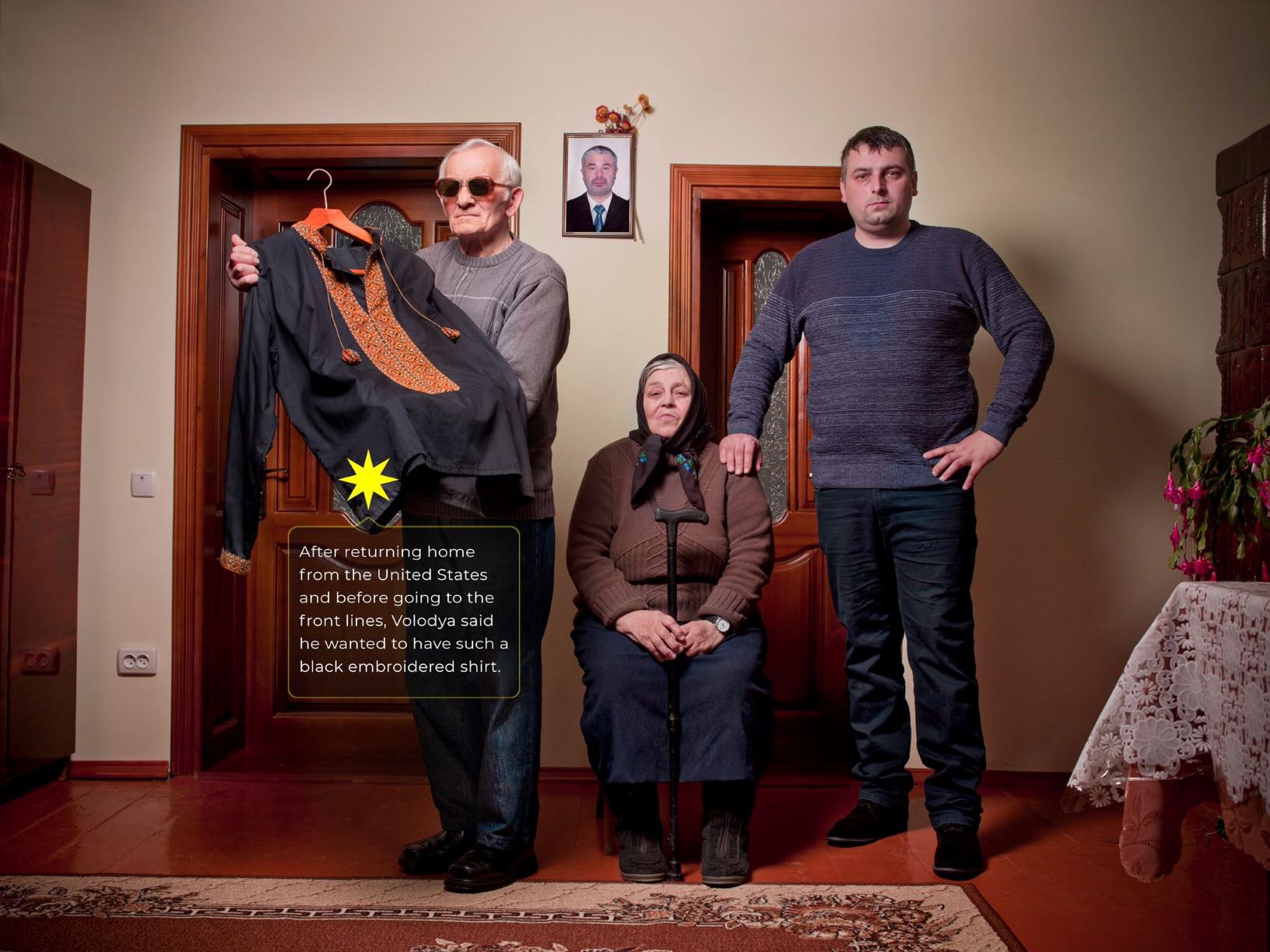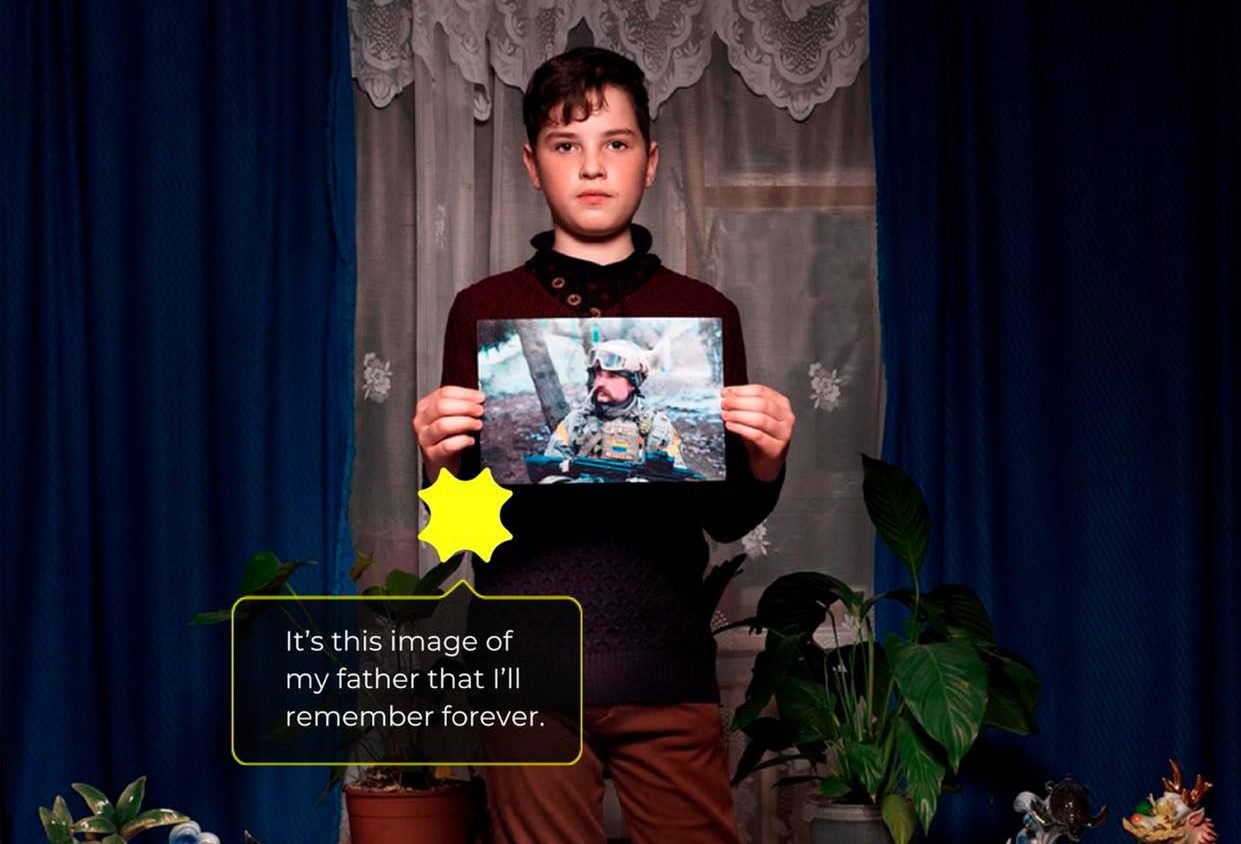Sergeant Dmytro Prydatko was killed by Russian occupation forces in the so-called “green corridor” on August 29, 2014. A convoy of Ukrainian soldiers was leaving the Ilovaisk hellhole, travelling between the villages of Mnohopillya and Chervonosilske, when an enemy missile hit Dmytro’s vehicle.
On September 3, 2014, the bodies of 97 Ukrainian soldiers killed near Ilovaisk were brought to Dnipro morgue. Dmytro was identified by his comrades-in-arms and relatives.
It is part of the Plus 1 project created to memorialize the fallen Defenders of Ukraine.
Over there, where I truly belong
Dmytro Prydatko: in Memoriam
Author: Maryna Lukyanova
It’s been six years since Dmytro disappeared from Nastya’s life and from the lives of all those left behind. Dmytro died, consumed by the fiery flames of the Ilovaisk hellhole and not in a blazing car accident or house fire. We will never ever forget Dmytro Prydatko, Hero of Ukraine, who began his life as an ordinary boy in Kirovohrad.
“Dima was sincere, honest, and authentic; he was pleasant, and it was always so easy to converse with him” – reminisces Anastasiya dreamily.

Dmytro was one of those unique individuals who was destined to become a soldier by the desire in his heart and the hand of fate. A slim, handsome young man in uniform, undoubtedly beguiling to many young women, who fanaticized strolling hand in hand along Dvortsova Street on fine summer evenings. And wanting to be with this man, who commanded respect from others and an unfailing pillar of support for the family… Nastya’s dream almost came true: they got along easily and began living together in a common law relationship.
 It wasn’t easy for Dmytro to adapt to civilian life, although he made an effort to find his place in the working world: he installed windows and doors, drove a taxi, and built cabinet furniture. But, his soul constantly longed for military service, with its regimentation and strict orders. In the army, he attained the rank of Senior Reconnaissance Officer and Sniper. In civilian life, he had gained experience in marksmanship, using bottles as targets. He even taught his wife how to shoot and how to throw knives. In time, their daughter, Masha, was born. Dmytro loved her fervently and with a heightened appreciation of every moment he spent with her, as if he intuitively knew his time with her was more precious than any worldly treasures.
It wasn’t easy for Dmytro to adapt to civilian life, although he made an effort to find his place in the working world: he installed windows and doors, drove a taxi, and built cabinet furniture. But, his soul constantly longed for military service, with its regimentation and strict orders. In the army, he attained the rank of Senior Reconnaissance Officer and Sniper. In civilian life, he had gained experience in marksmanship, using bottles as targets. He even taught his wife how to shoot and how to throw knives. In time, their daughter, Masha, was born. Dmytro loved her fervently and with a heightened appreciation of every moment he spent with her, as if he intuitively knew his time with her was more precious than any worldly treasures.
As a very idealistic and responsible person, Dima took the initiative to go to the military recruiting station when mobilization first began.
“This is my chance to return to military service, to go where I truly belong,” he explained to his wife.
In March 2014, instead of celebrating their anniversary, Nastya saw her husband off to the front.
Subsequent events unfolded rapidly, as in a dream. Frightening television news broadcasts were intertwined with rumours of full-scale war with Russia. The national election, economic crisis, and uncertainty about the future are all experienced even more stressfully when the dearest person in your life is fighting at the epicentre of all this upheaval. Dmytro telephoned regularly from the Anti-Terrorist Operation (ATO) zone, although he never spoke about what was happening there on the ground. He cautiously protected his wife, careful not to raise panic, any more than had already gripped hold of Ukrainian society. For three months, Nastya lived in a state of heightened stress, constantly expecting the worst. Those nine weeks were lived in the hope of a short visit with her love, and when he did come home, Dmytro arrived unannounced, awakening her in the morning with flowers and passionate kisses.
“I looked at him intently, gazing into his eyes, afraid to pose questions,” Nastya recalls of that emotional and anxious moment.
He returned home a stranger, aloof and pre-occupied with terrible secrets. After three months of intense warfare, Dmytro had become traumatized by the horrors of war. At home, he constantly relived his duties as a Reconnaissance Officer. His wife remembers him as unshaven, detached, suspicious and closemouthed. Gradually, Dmytro adapted to civilian life again, donning civilian clothes, smiling, joking and conversing calmly with friends. Nastya was afraid to leave him alone, even for a short while. She accompanied him down to the river, went shopping with him, and often cried alone, quietly.
 Nastya’s life also changed after this short visit. She better understood the laws of war, and neither asked questions nor felt offended when her husband didn’t allow her into his wounded and broken heart. When he returned to the front, when they spoke on the phone, Nastya would hear the sound of gunfire and explosions, which would set off in her a suffocating stress. But Dmytro would joke that it was just his comrades-in-arms, horsing around, firing their weapons and not an actual battle. Nastya pretended to believe him. Every day, she sent him photos of their daughter and of everyday life scenes – images, so distant and so unimaginable in the grey zone, filled with fear and hostility. As Dmytro’s personal psychotherapist, she had some success in turning his thoughts to those values for which he was risking his life. She once sent him a photo of their little daughter sitting in a diaper box with the caption, “Sending daddy a bundle.”
Nastya’s life also changed after this short visit. She better understood the laws of war, and neither asked questions nor felt offended when her husband didn’t allow her into his wounded and broken heart. When he returned to the front, when they spoke on the phone, Nastya would hear the sound of gunfire and explosions, which would set off in her a suffocating stress. But Dmytro would joke that it was just his comrades-in-arms, horsing around, firing their weapons and not an actual battle. Nastya pretended to believe him. Every day, she sent him photos of their daughter and of everyday life scenes – images, so distant and so unimaginable in the grey zone, filled with fear and hostility. As Dmytro’s personal psychotherapist, she had some success in turning his thoughts to those values for which he was risking his life. She once sent him a photo of their little daughter sitting in a diaper box with the caption, “Sending daddy a bundle.”
Our hero returned home for another visit in August. Once again he arrived unannounced, unexpectedly. During this visit, Nastya didn’t leave her husband’s side, as if she needed to breathe the same air he breathed. It was their daughter’s birthday, and guests from among their family and friends had gathered for the occasion. With tears in his eyes, Dmytro repeatedly thanked and toasted his guests. The next day, it seemed as if he was intent on buying out an entire store of gifts for his wife and child. He was talkative, recalling incidents that occurred at the front, how one time he was driving with his men and came under an artillery bombardment. Their vehicle rolled over twice, but no one was hurt; not a wound or a scratch.
“My cigarette didn’t even fall out of my mouth,” Dmytro recalled with a smile.
He spoke with such affection about his friends from the frontlines, that Nastya became convinced that these men were his second family. He also recounted an incident in which he was part of a group of five men returning to base from a mission. They later discovered that the field through which they had crossed was mined.
“But we made it across. See what a lucky man you have!” Dmytro told Nastya with a wink.
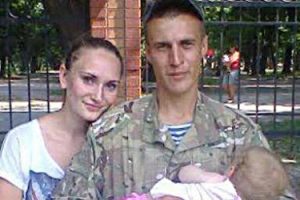
The second farewell was much easier than the first, inasmuch as Dmytro was planning to return in a week or two. Dmytro’s unit had departed earlier on an operation to the town of Ilovaisk. At their camp, the commander tried to convince Dmytro not to go, but Dmytro decided to join a different group of fighters to the Ilovaisk mission. A few days later, Nastya received a phone call that her husband had been killed. The enemy fighters had blown up the vehicle Dmytro was riding in. In the final moments of his life, lying on the ground, Dmytro held out a silver gemstone ring to his comrade in arms. A New Year’s gift from Nastya that he always wore around his neck as a talisman.
“Please get this back to my wife. Tell her I love her.”
And the comrade did return the ring to Nastya. Sometime later, Nastya once again saw this man, out for a stroll with his pregnant wife and their little child. The young widow was overwhelmed by heartbreak and envy, crying angrily and helplessly at the cruel karma that spared the life of this man, yet forever snatched away the life of her loved one.
As Nastya’s poignant narrative strikes my heart and seeps slowly and deeply into my soul, it gushes forth in these tear-filled words.

I am now convinced of the need to write and read about these heroes, and more importantly, to forever commemorate them. Our every word, every tear, every recollection, creates a sacred respect for the achievements of these individuals who sacrificed their lives for us.
We owe them this remembrance.
For as long as Memory remains, Heroes never die!
The project is built around 22 individual exhibition stands. In iconic and powerful moments captured by a photographer’s camera – Youry Bilak, a Frenchman of Ukrainian descent – Ukrainian families tell the stories of their loved ones – Ukrainian soldiers who perished in the war. Each narrative, each individual is but one small grain, one tiny unit of a module in a living organism. By telling his story, we bring him back to life.
Each family chose an object that most reminds them of their departed: a father’s jacket, a guitar, a suit of medieval armour, a book. These family artifacts reflect a living continuation of the departed loved one. Ukrainian artists, intellectuals, and journalists were invited to create original texts about each soldier.




